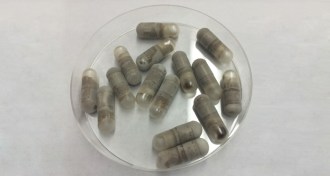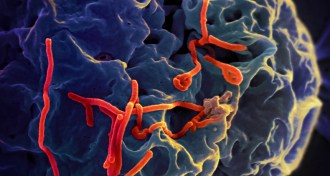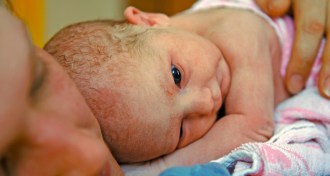Humans
Sign up for our newsletter
We summarize the week's scientific breakthroughs every Thursday.
-
 Health & Medicine
Health & MedicineFeedback
Readers discuss methods to prevent sepsis and whether genes are thrifty, while Tina Saey clears up some confusion regarding Ebola's airborne status.
-
 Microbes
MicrobesMicrobes can redeem themselves to fight disease
With some genetic engineering, bacteria can morph from bad to good and help attack invading cancer cells.
By Susan Gaidos -
 Health & Medicine
Health & MedicinePoop-transplant pills treat intestinal infection
Frozen capsules stuffed with healthy gut bacteria from donated poop fight C. difficile infections.
-
 Health & Medicine
Health & MedicineJet lag affects gut microbes
Jet-lagged bacteria in the gut impair mice’s metabolism, causing obesity and diabetes-related problems.
-
 Health & Medicine
Health & MedicineEbola continues rapid spread in West Africa
Ebola continues to spread in West Africa, but some countries are poised to declare victory over the deadly virus.
-
 Anthropology
AnthropologyAncient Greek shipwreck found to be world’s largest
Special diving suits enable discovery that much of a nearly 2,100-year-old Greek vessel and its cargo survive.
By Bruce Bower -
 Health & Medicine
Health & MedicinePneumococcal vaccine thwarts resistant infections in children
Since a new vaccine was introduced in 2010, the number of antibiotic-resistant pneumococcal infections in kids has plunged.
By Nathan Seppa -
 Health & Medicine
Health & MedicineDrug appears safe in children with C. difficile infections
Early test suggests adult med may work in kids with diarrheal disease.
By Nathan Seppa -
 Health & Medicine
Health & MedicineDallas health worker is first to catch Ebola in U.S.
A health worker in Dallas has Ebola. She is the first to catch the virus in the U.S.
-
 Health & Medicine
Health & MedicineDrug-resistant staph common in football players
Athletes in contact sports should wash their hands (and dirty gym clothes) often, researchers say.
By Nathan Seppa -
 Health & Medicine
Health & MedicineImpotence drug boosts insulin in some with diabetes
A drug called yohimbine lets some people with diabetes secrete more insulin by stopping pancreas cells from binding adrenaline molecules.
-
 Health & Medicine
Health & MedicineA timeline of a baby’s first hour
A study carefully documents newborns’ instinctual behaviors in the first hour outside the womb, observations that paint a picture of what babies might need in the moments after birth.